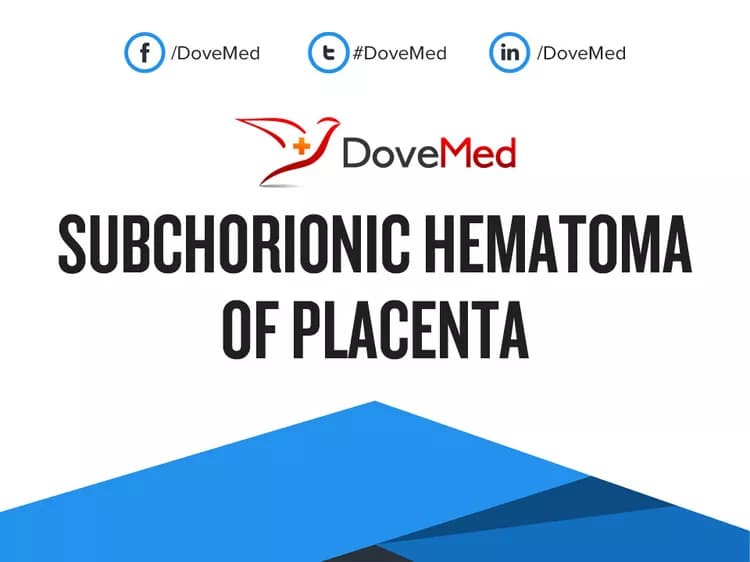What are the other Names for this Condition? (Also known as/Synonyms)
- Hematoma of Placenta
- Placental Hematoma
- Subchorionic Hemorrhage
What is Subchorionic Hematoma of Placenta? (Definition/Background Information)
- Subchorionic Hematoma of Placenta is the collection of blood between the placental membrane (chorion) and uterine walls. It is a common cause of 1st and 2nd trimester bleeding
- The placenta is an organ that connects the developing fetus to the uterine wall. It is a disc shaped reddish brown structure that connects the fetus to the mother through the umbilical cord. The umbilical cord contains two umbilical arteries and one umbilical vein
- The normal function of placenta is to supply nutrients and oxygen to the fetus from the mother’s blood and remove wastes from the fetal body
- The chorion and amnion are placental membranes. The chorion is the membrane that is present between the growing fetus and the mother. The amnion closely covers and protects the developing embryo
- Subchorionic Hematoma of Placenta may present with vaginal bleeding and abdominal pain. This condition may cause early labor or spontaneous abortion
- With proper and early treatment, the prognosis of Subchorionic Hematoma of Placenta is generally good
Who gets Subchorionic Hematoma of Placenta? (Age and Sex Distribution)
- Subchorionic Hematoma of Placenta can occur in women of all ages
- There is no racial, ethnic, or geographical predilection
- The condition is estimated to occur in 3% of all pregnancies
What are the Risk Factors for Subchorionic Hematoma of Placenta? (Predisposing Factors)
- Currently, no risk factors have been identified for Subchorionic Hematoma of Placenta
- Research is being performed to identify the relevant risk factors
It is important to note that having a risk factor does not mean that one will get the condition. A risk factor increases ones chances of getting a condition compared to an individual without the risk factors. Some risk factors are more important than others.
Also, not having a risk factor does not mean that an individual will not get the condition. It is always important to discuss the effect of risk factors with your healthcare provider.
What are the Causes of Subchorionic Hematoma of Placenta? (Etiology)
- The exact cause of Subchorionic Hematoma of Placenta is unknown
- A probable cause of the condition includes the separation of the chorionic membrane from the uterine wall, resulting in accumulation of blood and hematoma formation between them
What are the Signs and Symptoms of Subchorionic Hematoma of Placenta?
The signs and symptoms of Subchorionic Hematoma of Placenta include:
- Vaginal spotting or bleeding
- Lower abdominal pain
How is Subchorionic Hematoma of Placenta Diagnosed?
The diagnosis of Subchorionic Hematoma of Placenta may include:
- A thorough physical examination, correlated with a complete medical history (including family and social history)
- Abdominal ultrasonogram is the best method to diagnose Subchorionic Hematoma of Placenta
Many clinical conditions may have similar signs and symptoms. Your healthcare provider may perform additional tests to rule out other clinical conditions to arrive at a definitive diagnosis.
What are the possible Complications of Subchorionic Hematoma of Placenta?
Complications due to Subchorionic Hematoma of Placenta could include:
- Increased risk of abortion
- Premature labor
- Restricted growth of the fetus
How is Subchorionic Hematoma of Placenta Treated?
There is no specific treatment for Subchorionic Hematoma of Placenta.
- In most of the cases, the condition resolves on its own by the end of the 1st trimester or the beginning of the 2nd trimester
- Depending upon the size of the clot, the following measures are generally recommended:
- Bed rest
- Avoid lifting heavy weight
- Avoid strenuous physical activity
- Avoid constipation
- Immediately contact the physician if worrying symptoms start appearing
How can Subchorionic Hematoma of Placenta be Prevented?
Currently, there are no definitive methods available to prevent Subchorionic Hematoma of Placenta.
What is the Prognosis of Subchorionic Hematoma of Placenta? (Outcomes/Resolutions)
With appropriate management, the prognosis of Subchorionic Hematoma of Placenta is excellent.
Additional and Relevant Useful Information for Subchorionic Hematoma of Placenta:
The following DoveMed website link is a useful resource for additional information:
https://www.dovemed.com/diseases-conditions/pregnancy-related-disorders/
Related Articles
Test Your Knowledge
Asked by users
Related Centers
Related Specialties
Related Physicians
Related Procedures
Related Resources
Join DoveHubs
and connect with fellow professionals


0 Comments
Please log in to post a comment.